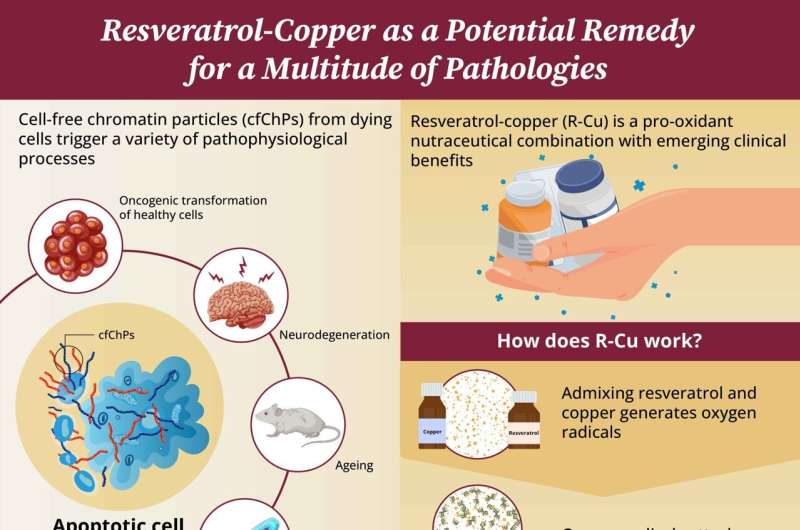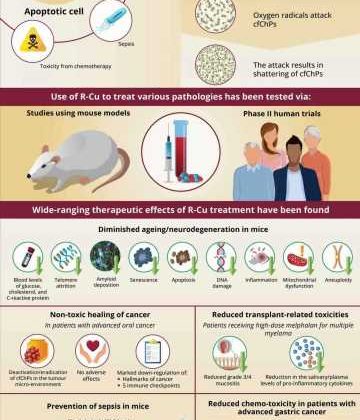
Chromatin comprises a complex mixture of DNA and proteins that forms the structural basis of chromosomes in the cellular nuclei. When cells die, they release cell-free chromatin particles, or cfChPs, into the circulatory system. In 1996, evidence for tumor-derived DNA circulating in the blood of cancer patients was first reported. This evidence caught the interest of Dr. Indraneel Mittra, who is now Professor Emeritus and the Dr. Ernest Borges Chair in Translational Research at Tata Memorial Centre in Mumbai, India.
His tryst with research on genetic material in cancer metastases began, and after 15 years of research he has presented various papers, developing a body of evidence that indicates the critical role of cfChPs in orchestrating development of not only cancer, but various other diseases. Emerging evidence indicates that cfChPs play an essential role in aging, sepsis, cancer development, and chemotherapy-related toxicity.
With respect to the latter, Prof. Mittra explains, “Chemo-toxicity is not primarily caused by chemotherapeutic drugs, but rather by cfChPs that are released from the first cells that die after chemotherapy. The released cfChPs set in motion a cascading effect, increasingly damaging the DNA of healthy host cells, and triggering inflammatory processes in a vicious cycle that perpetuates and prolongs the toxicity of chemotherapy.”
Recently, a team from Tata Memorial Centre have demonstrated the therapeutic benefits of a pro-oxidant mixture of resveratrol and copper, R-Cu, in patients undergoing chemotherapy for advanced gastric cancer. Combining R with Cu (R-Cu) leads to the generation of free oxygen radicals which can inactivate the offending cfChPs.
In this context, the research team launched a single-arm phase II clinical trial to study the synergistic effects of R-Cu administration on cfChPs inactivation in patients with advanced gastric cancer. The primary objective was to determine whether R-Cu, via cfChPs’ inactivation, was successful in reducing the grade ≥ 3 toxicity seen with docetaxel-based chemotherapies. To this end, the researchers monitored the likely changes in the toxicities of chemotherapeutic treatments using a grading system that provides a framework for the assessment of unwanted physiological effects.
The results were promising—although R-Cu did not reduce hematological toxicities, it significantly reduced the incidence of non-hematological toxicities comprising hand-foot syndrome, diarrhea, and vomiting. Moreover, R-Cu reduced docetaxel exposure compared to the control arm without affecting efficacy in terms of overall survival.
Prior to this, two studies from Prof. Mittra’s group used mouse models to demonstrate the benefits of R-Cu administration in the prevention of aging and sepsis. The first of these indicated that the cfChPs that are released from the billions of cells that die in the body every day and damage healthy cells is the underlying cause of aging, and prolonged oral administration of R-Cu leads to the downregulation of multiple biological parameters of aging including neurodegeneration, which is associated with Alzheimer’s disease.
The other study showed how cfChPs trigger sepsis after bacterial infection in mice; administering R-Cu prevented this pathological process, including the prevention of fatality.
The research group has also conducted human studies. One of their previous works suggested that cfChPs released from dying cancer cells enter surrounding surviving cancer cells and trigger DNA damage and inflammation and further contribute to their aggressive behavior—effects that could be mitigated by R-Cu administration. Another study reports reduced grade 3/4 mucositis and reduced levels of inflammatory proteins (or cytokines) in the serum and saliva of R-Cu-treated patients receiving bone marrow transplants with high-dose melphalan—a chemotherapeutic used to treat plasma cell cancers.
Dr. Mittra, who is the corresponding author of these articles, concludes, “Our evidence suggests that R-Cu can be a novel, cost-effective, and non-toxic agent which can be used for multiple disease conditions including cancer and metastasis prevention.”
This most recent research is published in Medical Oncology and Scientific Reports.
More information:
Vikas Ostwal et al, A pro-oxidant combination of resveratrol and copper reduces chemotherapy-related non-haematological toxicities in advanced gastric cancer: results of a prospective open label phase II single-arm study (RESCU III study), Medical Oncology (2022). DOI: 10.1007/s12032-022-01862-1
Kavita Pal et al, A pro-oxidant combination of resveratrol and copper down-regulates multiple biological hallmarks of ageing and neurodegeneration in mice, Scientific Reports (2022). DOI: 10.1038/s41598-022-21388-w
Indraneel Mittra et al, Cell-free chromatin particles released from dying host cells are global instigators of endotoxin sepsis in mice, PLOS ONE (2020). DOI: 10.1371/journal.pone.0229017
Aishwarya Pilankar et al, A pro-oxidant combination of resveratrol and copper down-regulates hallmarks of cancer and immune checkpoints in patients with advanced oral cancer: Results of an exploratory study (RESCU 004), Frontiers in Oncology (2022). DOI: 10.3389/fonc.2022.1000957
Anshul Agarwal et al, A novel pro-oxidant combination of resveratrol and copper reduces transplant related toxicities in patients receiving high dose melphalan for multiple myeloma (RESCU 001), PLOS ONE (2022). DOI: 10.1371/journal.pone.0262212
Journal information:
Scientific Reports
,
PLoS ONE
Source: Read Full Article
